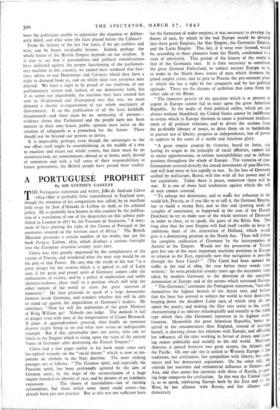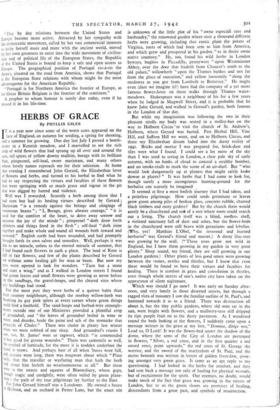A PORTUGUESE PROPHET
By SIR STEPHEN GASELEE
THE Portuguese statesman and writer, Jac) de Andrade Cory° (1824-1890) is probably little remembered in England now, though the attention of his compatriots was called, by an excellent little essay by Jose d'Almada in Lisbon in 1938, to his colonial policy. He is probably best known in this country by the publica- tion of a translation of one of his despatches on this subject pub- lished in London in 1877 by the Viscount de Sautarem, " A state- ment of facts proving the right of the Crown of Portugal to the territories situated on the western coast of Africa." The British Museum possesses a certain number of his works, but not his book Perigos, Lisbon, 1870, which displays a curious foresight into the European situation seventy years later.
Corvo was very greatly impressed by the completeness of the victory of Prussia, and wondered what the next step would be on the part of that Power. He says that the result of the war " is a great danger for the nations which it is agreed to call of Latin race, if the great and proud spirit of Germany cannot calm the enthusiasms of victory, and by a policy of moderation and noble disinterestedness, place itself in a position which will help the other nations of the world to serve the great interests of humanity." He then proceeds to speak of a large democratic element inside Germany, and wonders whether this will be able to stand up against the imperialism of Germany's leaders. He continues, " How far will the aspirations of the great Minister of King William go? Nobody can judge. The outlook is full of danger even with men of the temperament of Count Bismarck. If plans of aggrandisement proceed, then finally an immense disaster might bring to an end what now seems an indisputable triumph. But if this catastrophe does not arrive, who can set limits to the Empire which is rising upon the ruins of the ancient States of Germany after destroying the French Empire? "
Com had a few pages earlier in his book made some very far-sighted remarks on the " racial theory " which is now so im- portant an element in the Nazi doctrine. The most striking passages are as follows: " The German spirit, and especially the Prussian spirit, has been profoundly agitated by the idea of German unity, by the hope of the reconstitution of a huge empire founded on identity of race, and by dreams of an indefinite expansion. . . . The theory of nationalities—not of existing nationalities, but those which some fancy could create—has already been put into practice. But as this was not sufficient basis
for the formation of wider empires, it was necessary' to develop the -theory of race, by which in the end Europe would be divided into three great Empires, the Slav Empire, the Germanic Empire, and the Latin Empire. This last, if it were ever formed, would be, according to these planners from the North, condemned to a state of inferiority. This period of the history of the world is that of the Germanic race. It is then necessary to constitute the great German Fatherland, to subject ancient Europe to it, to make in the North those waves of men which threaten the grand empire retire, and to give to Prussia the pre-eminent place tc which she has a right by her conquests and by her political aptitude. These are the dreams of ambition that come from the other side of the Rhine.
" The immense gravity of the question which is at present so urgent in Europe cannot fail to react upon the great American Republic. In the midst of their political strifes, which are not always without bloodshed, the United States cannot be indifferent to events which in Europe threaten to cause a profound readjust- ment of all political relations, and to divert the nations from the profitable labours of peace, to drive them on to battlefields in pursuit not of liberty, progress or independence, but of power to oppress in the name of a sterile and injurious glory.
" A great empire created by victories, based on force, and having its origin in the principle of racial affinities, cannot fail to excite apprehensions, to irritate susceptibilities and to inflame passions throughout the whole of Europe. .The victories of pan- Germanism aroused directly the armed movements of pan-Slavism, and will lead more or less rapidly to war. In the face of Germany unified by militarism, Russia will rise with all her power and all her aspirations. Today there is peace, tomorrow there will be war. It is one of those fatal tendencies against which the will of men cannot contend.
" To enlarge her dominions, and to male her influence in the world felt, Prussia, or if you like so to call it, the German Empire,
has to build a strong fleet, and to this end (putting aside all
scruples of conscience, as happened in the case of the Danish Dutchies) to try to make sure of the whole territory of Denmark in order to close, so to speak, the gates of the Baltic Sea. Not
long after that the new Empire will find itself unable to keep its ambitions short of the annexation of Holland, which would
give it a dominating position in the North Sea. Then will follow the complete unification of Germany` by the incorporation of Austria in the Empire. Would not the possession of Trieste give her one of the most important maritime positions in Europe in relation to the East, especially now that navigation is possible through the Suez Canal? " (The Canal had been opened for traffic at the end of 5869, the year before these words were written.) So were; predicted seventy years ago the successive steps taken by modern Germany in the direction of the complete domination of Europe and of the oceans which surround Europe.
" The Germans," continues the Portuguese statesman, "consider themselves the highest branch of the Aryan race, and believe that the hour has arrived to subject the world to their dominion, keeping down the decadent Latin race, of which they do not admit the purity, and making the Slav race retire to the north, characterising it as inferior ethnologically and morally to the noble type which they (the Germans) represent in its highest mani- festation. Meanwhile the great American Republic, better in- spired in the circumstances than England, instead of isolating herself, is drawing closer her relations with Europe, and affirming her influence, all the time working in favour of peace, and draw- ing nearer politically and socially to the old world. Northern America is poised between two great oceans, the Atlantic and the Pacific. On one side she is united to Western Europe in her traditions, her civilisation, her sympathies with liberty, her com- merce and her democratic aspirations. On the other side, she extends her maritime and commercial influence to Oceania and Asia, and thus unites her interests with those of Russia, prePar- ing large conquests for civilisation. In this way the United States is, so to speak, embracing Europe both by the East and by the West, by her alliance with Russia, and her alliance with democracy. •
" Day by day relations between the United States and Europe become more active. Attracted by her sympathy with the democratic movement, called by her vast commercial interests to unite herself more and more with the ancient world, moved by her own greatness to enter into the wide movement of civilisa- tion and of political life of the European States, the Republic of the United States is bound to keep a safe and open access to Europe. The geographical position of Portugal vis-à-vis the Azores, situated on the road from America, shows that Portugal is the European State relations with whom might be the most advantageous for the American Republic.
"Portugal is for Northern America the frontier of Europe, as for Great Britain Belgium is the frontier of the continent."
A prophet to whom honour is surely due today, even if he missed it in his life-time.



























 Previous page
Previous page